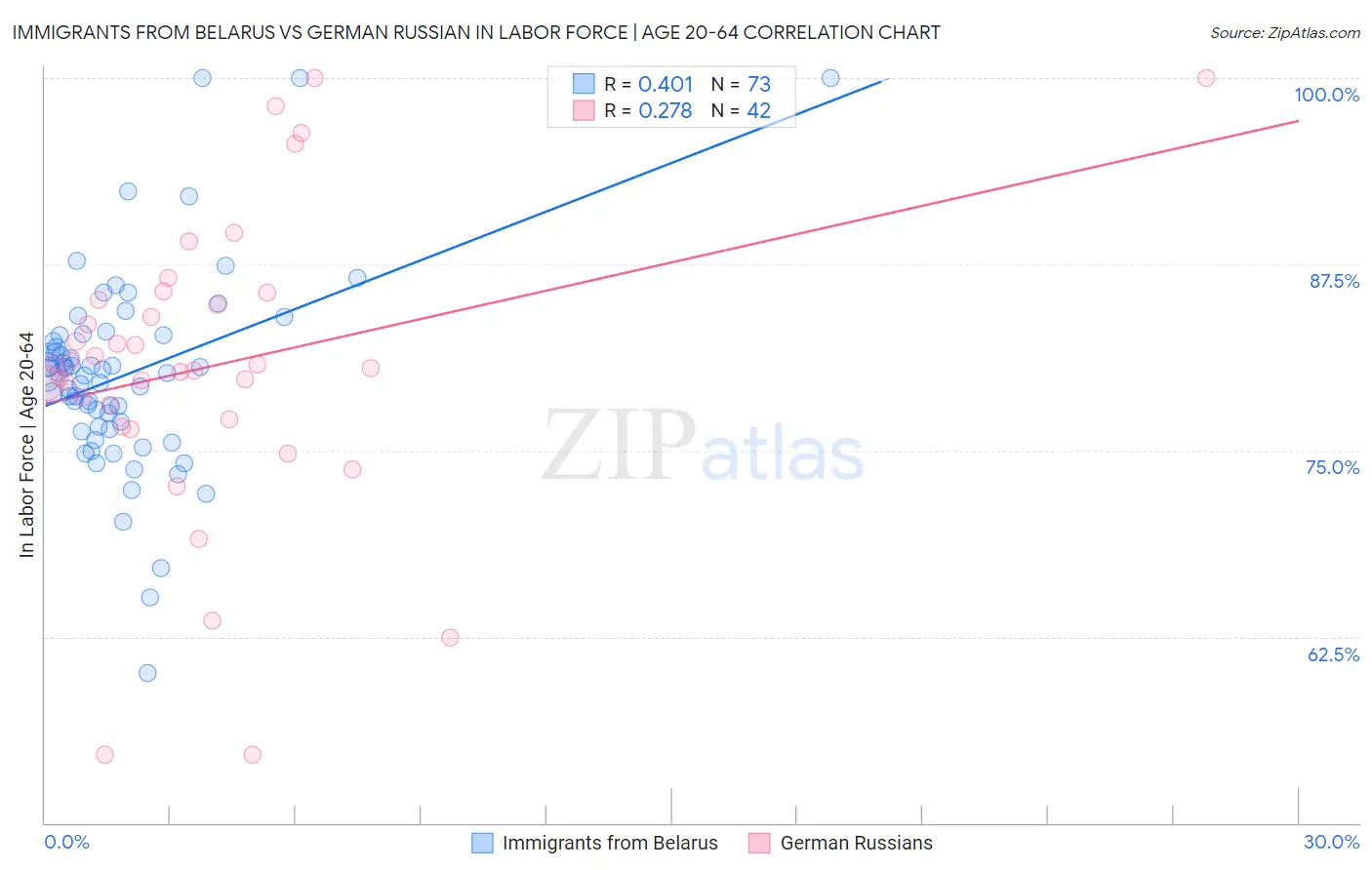Immigrants from Belarus vs German Russian In Labor Force | Age 20-64
COMPARE
Immigrants from Belarus
German Russian
In Labor Force | Age 20-64
In Labor Force | Age 20-64 Comparison
Immigrants from Belarus
German Russians
80.1%
IN LABOR FORCE | AGE 20-64
96.4/ 100
METRIC RATING
93rd/ 347
METRIC RANK
80.1%
IN LABOR FORCE | AGE 20-64
97.3/ 100
METRIC RATING
81st/ 347
METRIC RANK
Immigrants from Belarus vs German Russian In Labor Force | Age 20-64 Correlation Chart
The statistical analysis conducted on geographies consisting of 150,198,984 people shows a moderate positive correlation between the proportion of Immigrants from Belarus and labor force participation rate among population between the ages 20 and 64 in the United States with a correlation coefficient (R) of 0.401 and weighted average of 80.1%. Similarly, the statistical analysis conducted on geographies consisting of 96,458,963 people shows a weak positive correlation between the proportion of German Russians and labor force participation rate among population between the ages 20 and 64 in the United States with a correlation coefficient (R) of 0.278 and weighted average of 80.1%, a difference of 0.060%.

In Labor Force | Age 20-64 Correlation Summary
| Measurement | Immigrants from Belarus | German Russian |
| Minimum | 60.1% | 54.6% |
| Maximum | 100.0% | 100.0% |
| Range | 39.9% | 45.4% |
| Mean | 80.1% | 80.6% |
| Median | 80.2% | 80.7% |
| Interquartile 25% (IQ1) | 76.5% | 77.1% |
| Interquartile 75% (IQ3) | 82.7% | 85.1% |
| Interquartile Range (IQR) | 6.2% | 8.0% |
| Standard Deviation (Sample) | 6.7% | 10.1% |
| Standard Deviation (Population) | 6.7% | 9.9% |
Demographics Similar to Immigrants from Belarus and German Russians by In Labor Force | Age 20-64
In terms of in labor force | age 20-64, the demographic groups most similar to Immigrants from Belarus are Polish (80.1%, a difference of 0.020%), Uruguayan (80.1%, a difference of 0.020%), Ghanaian (80.1%, a difference of 0.020%), Immigrants from Asia (80.1%, a difference of 0.020%), and Yugoslavian (80.1%, a difference of 0.020%). Similarly, the demographic groups most similar to German Russians are Immigrants from Japan (80.1%, a difference of 0.0%), Colombian (80.1%, a difference of 0.0%), Immigrants from Latvia (80.1%, a difference of 0.010%), Jordanian (80.1%, a difference of 0.010%), and Immigrants from Egypt (80.1%, a difference of 0.010%).
| Demographics | Rating | Rank | In Labor Force | Age 20-64 |
| Immigrants | Colombia | 97.8 /100 | #77 | Exceptional 80.2% |
| Immigrants | Romania | 97.8 /100 | #78 | Exceptional 80.2% |
| Asians | 97.7 /100 | #79 | Exceptional 80.2% |
| Immigrants | Croatia | 97.6 /100 | #80 | Exceptional 80.1% |
| German Russians | 97.3 /100 | #81 | Exceptional 80.1% |
| Immigrants | Japan | 97.3 /100 | #82 | Exceptional 80.1% |
| Colombians | 97.3 /100 | #83 | Exceptional 80.1% |
| Immigrants | Latvia | 97.2 /100 | #84 | Exceptional 80.1% |
| Jordanians | 97.2 /100 | #85 | Exceptional 80.1% |
| Immigrants | Egypt | 97.1 /100 | #86 | Exceptional 80.1% |
| Croatians | 97.1 /100 | #87 | Exceptional 80.1% |
| Chileans | 97.0 /100 | #88 | Exceptional 80.1% |
| Immigrants | Venezuela | 96.8 /100 | #89 | Exceptional 80.1% |
| Poles | 96.8 /100 | #90 | Exceptional 80.1% |
| Uruguayans | 96.7 /100 | #91 | Exceptional 80.1% |
| Ghanaians | 96.7 /100 | #92 | Exceptional 80.1% |
| Immigrants | Belarus | 96.4 /100 | #93 | Exceptional 80.1% |
| Immigrants | Asia | 96.0 /100 | #94 | Exceptional 80.1% |
| Yugoslavians | 95.9 /100 | #95 | Exceptional 80.1% |
| Immigrants | Malaysia | 95.9 /100 | #96 | Exceptional 80.1% |
| South Americans | 95.9 /100 | #97 | Exceptional 80.1% |